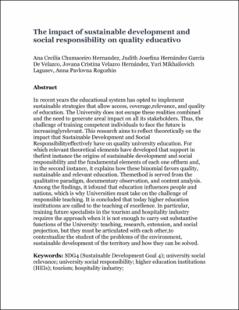Mostrar el registro sencillo del ítem
The impact of sustainable development and social responsibility on quality education
| dc.rights.license | Atribución-NoComercial-SinDerivadas 4.0 Internacional (CC BY-NC-ND 4.0) | spa |
| dc.contributor.author | Chumaceiro Hernández, Ana Cecilia | |
| dc.contributor.author | Hernández García de Velazco, Judith Josefina | |
| dc.contributor.author | Velazco Hernández, Jovana Cristina | |
| dc.contributor.author | Govorukhin, Yuri Mikhailovich | |
| dc.contributor.author | Pavlovna Rogozhina, Anna | |
| dc.date.accessioned | 2023-02-01T15:02:37Z | |
| dc.date.available | 2024 | |
| dc.date.available | 2023-02-01T15:02:37Z | |
| dc.date.issued | 2022 | |
| dc.identifier.issn | 2068-7729 | spa |
| dc.identifier.uri | https://hdl.handle.net/11323/9856 | |
| dc.description.abstract | In recent years the educational system has opted to implement sustainable strategies that allow access, coverage,relevance, and quality of education. The University does not escape these realities combined and the need to generate areal impact on all its stakeholders. Thus, the challenge of training competent individuals to face the future is increasinglyrelevant. This research aims to reflect theoretically on the impact that Sustainable Development and Social Responsibilityeffectively have on quality university education. For which relevant theoretical elements have developed that support in thefirst instance the origins of sustainable development and social responsibility and the fundamental elements of each one ofthem and, in the second instance, it explains how these binomial favors quality, sustainable and relevant education. Themethod is served from the qualitative paradigm, documentary observation, and content analysis. Among the findings, it isfound that education influences people and nations, which is why Universities must take on the challenge of responsible teaching. It is concluded that today higher education institutions are called to the teaching of excellence. In particular, training future specialists in the tourism and hospitality industry requires the approach when it is not enough to carry out substantive functions of the University: teaching, research, extension, and social projection, but they must be articulated with each other,to contextualize the student of the problems of the environment, sustainable development of the territory and how they can be solved | eng |
| dc.format.extent | 1 página | spa |
| dc.format.mimetype | application/pdf | spa |
| dc.language.iso | eng | spa |
| dc.publisher | ASERS Publishing | spa |
| dc.rights | 2023 © CEEOL. ALL Rights Reserved | eng |
| dc.rights.uri | https://creativecommons.org/licenses/by-nc-nd/4.0/ | spa |
| dc.source | https://www.ceeol.com/search/article-detail?id=1083399 | spa |
| dc.title | The impact of sustainable development and social responsibility on quality education | eng |
| dc.type | Artículo de revista | spa |
| dc.rights.accessrights | info:eu-repo/semantics/embargoedAccess | spa |
| dc.identifier.instname | Corporación Universidad de la Costa | spa |
| dc.identifier.reponame | REDICUC – Repositorio CUC | spa |
| dc.identifier.repourl | https://repositorio.cuc.edu.co/ | spa |
| dc.publisher.place | Romania | spa |
| dc.relation.ispartofjournal | Journal of Environmental Chemical Engineering | spa |
| dc.subject.proposal | SDG4 (Sustainable Development Goal 4) | eng |
| dc.subject.proposal | University social relevance | eng |
| dc.subject.proposal | University social responsibility | eng |
| dc.subject.proposal | Higher education institutions (HEIs) | eng |
| dc.subject.proposal | Tourism | eng |
| dc.subject.proposal | Hospitality industr | eng |
| dc.type.coar | http://purl.org/coar/resource_type/c_6501 | spa |
| dc.type.content | Text | spa |
| dc.type.driver | info:eu-repo/semantics/article | spa |
| dc.type.redcol | http://purl.org/redcol/resource_type/ART | spa |
| dc.type.version | info:eu-repo/semantics/draft | spa |
| dc.relation.citationendpage | 62 | spa |
| dc.relation.citationstartpage | 51 | spa |
| dc.relation.citationissue | 1 | spa |
| dc.relation.citationvolume | 13 | spa |
| dc.type.coarversion | http://purl.org/coar/version/c_b1a7d7d4d402bcce | spa |
| dc.rights.coar | http://purl.org/coar/access_right/c_f1cf | spa |
Ficheros en el ítem
Este ítem aparece en la(s) siguiente(s) colección(ones)
-
Artículos científicos [3154]
Artículos de investigación publicados por miembros de la comunidad universitaria.


